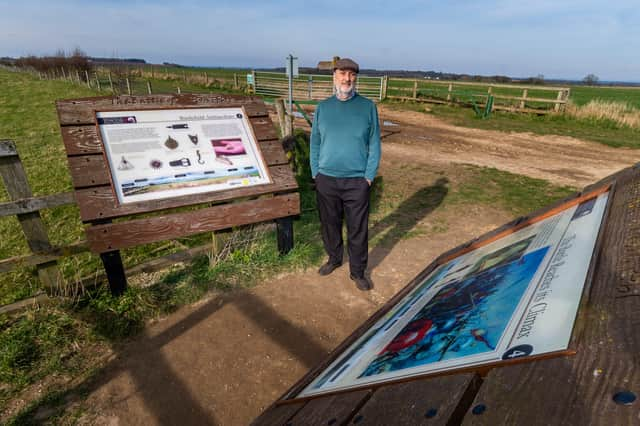Exactly 560 years on, have we learned anything from the bloodbath at Towton?


On the arable fields between Towton and Saxton, overshadowed by the memorial stone cross of long ago, information boards try to make sense of the slaughter that went on there, on this day 560 years ago.
The parish council, to which Mr Webb is Clerk, helped put them up, in an attempt to explain the history to those who know of Towton only from distantly recalled school days. Yet the story remains relevant today, according to one historian, and serves as a reminder that history is nearly always written by the winners.
Advertisement
Hide AdAdvertisement
Hide AdThe Battle of Towton was the largest – and probably the bloodiest – ever to have taken place on English soil. Estimates vary, but the best guess is that some 28,000 people died on the battlefield that day – around 1.5 per cent of the entire population.
“It had huge consequences for the local area, but it’s often overlooked because it was neither the beginning nor the end of the Wars of the Roses,” said historian Dan Moorhouse, who has published a book to mark the 560th anniversary.
“It serves as an object lesson to us today that if you don’t manage a country properly, things can go horribly wrong.”
It was in a snowstorm on Palm Sunday of 1461 that more than 50,000 soldiers from the Houses of York and Lancaster engaged in battle. The Yorkists were at first outnumbered, but as reinforcements arrived, hand-to-hand combat ensued – with fleeing Lancastrians trampled or drowned in rivers which were said to run red with blood for days. The rout went from Towton all the way to York, 15 miles away, and fresh troops had to climb over corpses to reach the front lines.
Advertisement
Hide AdAdvertisement
Hide AdBut while Towton proved to be a decisive victory for the Yorkists, with the Lancastrians unable to muster a field army for another three years, their cause was far from over. King Henry and his wife Margaret had escaped with their son and heir to Scotland, and it would take another 25 years – and a rebellion against the newly-crowned Edward VI – before the political and physical battles would finally end.
“Had there been no rebellion, the Battle of Towton would be remembered as the point of regime change, and the course of Royal history would look very different,” said Mr Moorhouse.
“But Towton remains a significant turning point in English history, the result of a perception that government was unfair and unjust, with too much institutionalised favouritism. That led to conflict on all levels.”
The favouritism extended even to the grave, with only the rich and famous commemorated by the surviving memorials.
Advertisement
Hide AdAdvertisement
Hide Ad“The saddest thing is that it could all have been avoided,” said Mr Moorhouse, a former resident of the area whose self-published book, On This Day in Wars of the Roses, is available on Amazon. “More could have been done to accommodate the different factions. It didn’t need to get totally out of hand.”
Today, the soil has claimed back Towton, and a circular walk has been established by the parish council to take visitors around the battlefield site and the Old London Road.
But the land continues to give up its secrets. A decade ago, an archeological dig, led by experts in York, discovered evidence of the large burial pits used to accommodate the anonymous foot soldiers. The researchers also found what is thought to be the oldest handgun used in battle.
Support The Yorkshire Post and become a subscriber today. Your subscription will help us to continue to bring quality news to the people of Yorkshire. In return, you’ll see fewer ads on site, get free access to our app and receive exclusive members-only offers. Click here to subscribe.
Comment Guidelines
National World encourages reader discussion on our stories. User feedback, insights and back-and-forth exchanges add a rich layer of context to reporting. Please review our Community Guidelines before commenting.